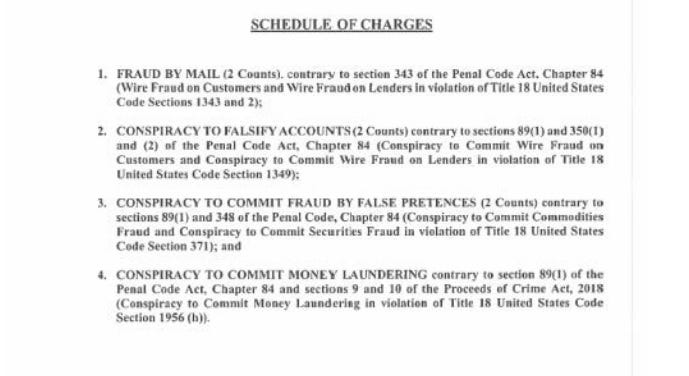Is Following An Extradition Treaty An Elaborate Political Conspiracy?
No. No it is not. That's Just Wrong, Glenn.
Glenn Greenwald, compulsive Fox guest and professional agitee, has written many smart and important things over the course of his career about abuses of power by the United States government. This is not one of those times.
Glenn is agitated because the United States decided to drop a charge of conspiracy to commit campaign finance violations it had previously brought against infamous manchild Sam Bankman-Fried, the answer to the question “how bad could it be, being raised by two Stanford professors?” Glenn views this as a conspiracy to protect SBF, Democrats, and presumably Hunter Biden:
Glenn’s point is dumb. Since Glenn is absolutely not dumb, Glenn’s speaking from lazy ignorance, bad faith, or blinding hatred of the Democratic establishment and U.S. Department of Justice. Those things are not optimal for accuracy. In fact, the United States dropped campaign finance charges against SBF to comply with its treaty obligations.
The Extradition Treaty and the Rule of Specialty
The United States has an extradition treaty with the Bahamas, as it does with many countries. Here it is:
The treaty sets forth the procedures for the United States and the Bahamas to request extradition of accused criminals from each other, and governs which crimes qualify for extradition. Like most extradition treaties, this one incorporates the Rule of Specialty. That familiar rule provides that, with a few exceptions, the requesting country (here, the U.S.) can only prosecute a defendant for crimes for which the extraditing country (here, the Bahamas) agreed to extradite them. This is intended to prevent requesting countries from saying “please send us this dude, he murdered someone,” and then prosecuting them for sedition or blasphemy or something else unacceptable to the extraditing country. There are a few exceptions, the most important of which is that the requesting country can ask the sending country for its consent to prosecute the defendant for additional crimes beyond those in the extradition order. Here’s how the United States Attorney’s Manual describes those exceptions and how federal prosecutors should deal with them:
Every extradition treaty limits extradition to certain offenses. As a corollary, all extradition treaties restrict prosecution or punishment of the fugitive to the offense for which extradition was granted unless (1) an offense was committed after the fugitive's extradition or (2) the fugitive remains in the jurisdiction that requested extradition after expiration of a reasonable time (generally specified in the extradition treaty itself) following acquittal or completion of his or her punishment. This limitation is referred to as the Rule of Specialty. Federal prosecutors who wish to proceed against an extradited person on charges other than those for which extradition was granted must contact the Office of International Affairs (OIA) for guidance regarding the availability of a waiver of the Rule by the sending State.
Here’s how the extradition treaty between the U.S. and the Bahamas articulates the rule:
(1) A person extradited under this Treaty may only be detained, tried, or punished in the Requesting State for the offense for which extradition was granted, or --
(a) any offense committed after the extradition;
(b) any offense in respect of which the executive authority of the Requested State, in accordance with its laws, has consented to the person's detention, trial, or punishment; and for the purposes of this subparagraph the Requested State shall require compliance with the extradition procedures specified in Article 8 and the submission of the documents specified in that Article . . .
The Bahamas’ Limited Extradition of SBF
When the United States initially charged Sam Bankman-Fried, it brought a variety of charges including conspiracy to defraud the United States and violate campaign finance laws. Sam Bankman-Fried decided to waive extradition proceedings and consent to extradition. The Bahamian Minister of Foreign Affairs executed a warrant of surrender governing the extradition. Here it is:
Notably, however, the Warrant of Surrender didn’t extradite SBF on all of the charges in the indictment. It omitted conspiracy to commit campaign finance fraud:
Why? Not sure. To indulge in speculation, the Bahamas might have seen the campaign finance charges as “political” rather than substantive, something that countries are historically reluctant to extradite over.
SBF’s Unsuccessful Motion To Dismiss and The Bahamas’ “Clarification”
The United States later filed superseding indictments adding a bunch of additional charges. SBF filed a motion to dismiss the charges that were not in the Warrant of Surrender — that is, the charges that the Bahamas had not expressly agreed to extradite SBF on. United States District Court Judge Lewis A. Kaplan ruled that SBF did not have standing to argue that the United States was violating the Rule of Specialty. Following the majority rule, he said that’s up to the Bahamas to enforce:
The Extradition Treaty here at issue does not provide that it may be enforced by an individual. Nor is there any language indicating that The Bahamas and the United States intended it to be so enforceable. Accordingly, under the Second Circuit's binding precedent, the rule of specialty may be invoked here only by The Bahamas. The defendant lacks standing to do so.
Judge Kaplan also noted that the United States has conceded that it is bound by the Rule of Specialty, but argued that it thought that the Bahamas mistakenly omitted the campaign finance charges from the Warrant of Surrender and they were asking the Bahamas to clarify and would abide by its decision:
The Court notes that the United States has notified The Bahamas of the additional charges in the S5 Indictment and is seeking a specialty waiver for the post-extradition charges. It concedes that The Bahamas' “response will be dispositive,” and that the government will not proceed on the new counts if The Bahamas denies its request. As to the campaign finance charge - Count Eight of the original indictment and Count Twelve of the S5 Indictment - the government maintains that the rule of specialty does not apply because the “extradition record as a whole suggests that the defendant was extradited on all counts in the original indictment.” Nevertheless, “[i]n an abundance of caution,” the United States “has conveyed to The Bahamas its understanding that the omission of the campaign finance charge [from the defendant's warrant of surrender] was inadvertent, and informed The Bahamas that, absent timely information to the contrary from The Bahamas,” it intends to proceed on that charge. The government has represented that it will not proceed on the campaign finance charge if The Bahamas objects.
So the United States asked the Bahamas to clarify that it meant to allow the U.S. to prosecute the campaign finance fraud charge, or else to consent to its prosecution. SBF went to court in the Bahamas and got an injunction temporarily barring the Bahamas from agreeing to that on the theory that it deprived him of his right to object under Bahamas law. As far a I can tell the Bahamas are still deciding what stance to take on most of the new charges the United States has added — that is, whether to consent under the Rule of Specialty to the United States prosecuting them even though they weren’t part of the extradition. However, on July 28, 2023, the United States reported to Judge Kaplan that the Bahamas had confirmed it did not intend to extradite SBF on the campaign finance count, and therefore the United States would abide by its treaty obligations and not prosecute that count:
The Government has been informed that The Bahamas notified the United States earlier today that The Bahamas did not intend to extradite the defendant on the campaign contributions count. Accordingly, in keeping with its treaty obligations to The Bahamas, the Government does not intend to proceed to trial on the campaign contributions count.
The United States is Correct To Abide By The Treaty
Glenn Greenwald ain’t dumb. He’s written many important and complex things about government misconduct. He still does occasionally. But today’s Glenn Greenwald is the Tucker Carlson toady and anti-Democratic partisan, and when there’s an opportunity to accuse the Department of Justice or a Democrat of a wild conspiracy, he takes it, however delusional.
Glenn’s ridicule here is dishonest or, at least, willfully ignorant. He spins it as if the U.S. is just being nice to the Bahamas, as opposed to abiding by treaty obligations. He doesn’t tell his readers about the treaty obligations at all. He doesn’t tell his readers that the United States has grown much more careful to abide by extradition treaties after 9/11 because treaty violations makes it much easier for other countries to rationalize not extraditing people we want. He doesn’t pretend to cite cases where the United States defied the Rule of Specialty and violated treaties on the grounds that the extraditing country was powerless, as he suggests the United States should have done. Glenn treats this some sort of substantial victory for SBF, despite the fact that the campaign finance charges have absolutely no cumulative effect on the already draconian sentence SBF faces on fraud charges involving billions of dollars. SBF’s sentence exposure has been reduced from “life plus cancer and we kill everyone in your family” to “life plus cancer and we kill everyone in your family except one of your second cousin’s three goldfish.”
I suspect, if pressed, Glenn Greenwald will say that it doesn’t matter that the campaign finance charges were a drop in SBF’s United States Sentencing Guidelines bucket; clearly the Department of Justice allowed itself to be bullied by the Bahamas to protect Democratic politicians from scrutiny for accepting SBF donations. Hence, Glenn’s theory is that the Department of Justice investigated SBF for campaign finance fraud, called attention to campaign finance fraud by charging SBF for it, and then decided to protect the Democratic establishment by . . . abiding by treaty obligations. It’s a very Greenwaldian scenario.
The United States has a long, embarrassing history of violating treaty obligations. To be fair, in connection with extradition treaties, the United States prefers not to violate them directly but just kidnap and specially render people without legal process at all. But the United States treating its treaty obligations professionally and seriously is a good thing. It’s the sort of adherence to the rule of law that Glenn, as a critic of abuse of power, used to demand. Now, though, he’s more like his braying followers, portraying the rule of law as some effeminate sigil of the decline of America:
Glenn richly deserves his new friends.







It really wouldn't be to protect Democrats in any case, since the $40 million SBF gave them is all adequately reported without a need for a criminal trial, whereas the at least $40 million he gave to Republicans, as he helpfully explained https://time.com/6241262/sam-bankman-fried-political-donations/, was not: “All my Republican donations were dark,” he said, referring to political donations that are not publicly disclosed in FEC filings. “The reason was not for regulatory reasons, it’s because reporters freak the f—k out if you donate to Republicans.”
Wow, how shocking that the staggeringly racist account would be a fan of Greenwald.